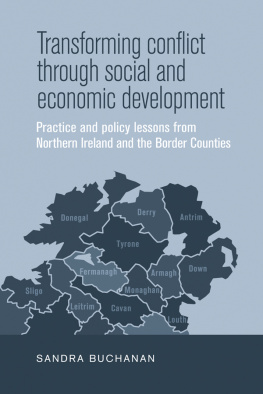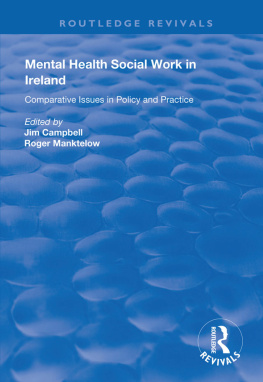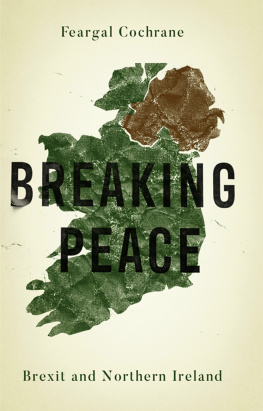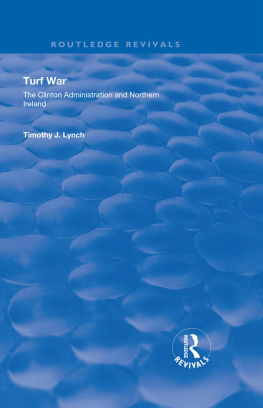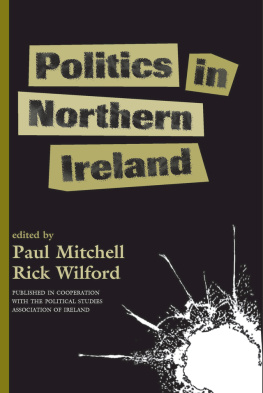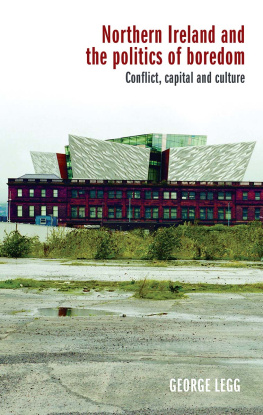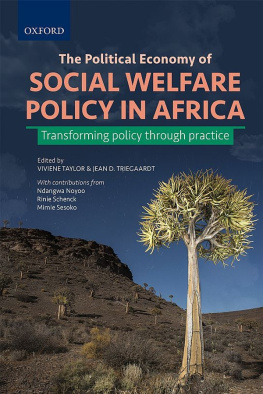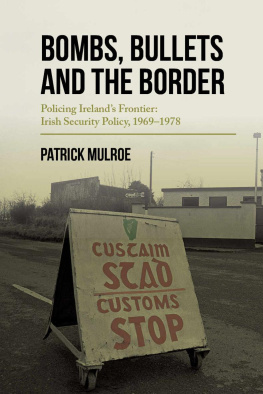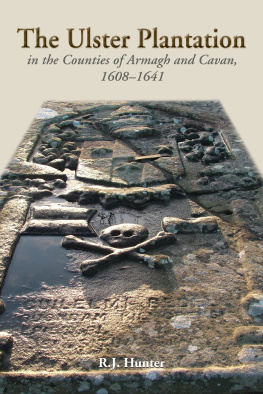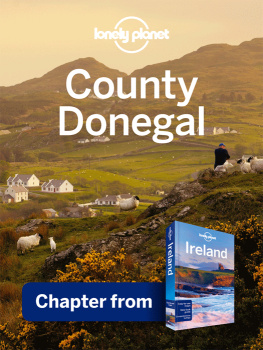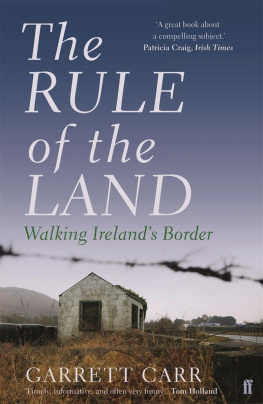Transforming conflict through social and economic development
Transforming conflict through social and economic development
Practice and policy lessons from Northern Ireland and the Border Counties
SANDRA BUCHANAN
Manchester University Press
Manchester and New York
distributed exclusively in the USA
by Palgrave Macmillan
Copyright Sandra Buchanan 2014
The right of Sandra Buchanan to be identified as the author of this work has been asserted by her in accordance with the Copyright, Designs and Patents Act 1988.
Published by Manchester University Press
Oxford Road, Manchester M13 9NR, UK
and Room 400, 175 Fifth Avenue, New York, NY 10010, USA
www.manchesteruniversitypress.co.uk
Distributed exclusively in the USA by
Palgrave, 175 Fifth Avenue, New York,
NY 10010, USA
Distributed exclusively in Canada by
UBC Press, University of British Columbia, 2029 West Mall,
Vancouver, BC, Canada V6T 1Z2
British Library Cataloguing-in-Publication Data
A catalogue record for this book is available from the British Library
Library of Congress Cataloging-in-Publication Data applied for
ISBN 978 0 7190 8823 0 hardback
First published 2014
The publisher has no responsibility for the persistence or accuracy of URLs for any external or third-party internet websites referred to in this book, and does not guarantee that any content on such websites is, or will remain, accurate or appropriate.
Typeset in Sabon by
Koinonia, Manchester
Contents
I owe my deepest thanks and gratitude to a number of people: to Professor Paul Arthur and Dr Stephen Ryan of the University of Ulsters Magee Campus for their invaluable guidance and support during the six years through which this research was carried out; to my previous employer, County Monaghan Vocational Education Committee (VEC), particularly its former CEO Larry McCluskey, whose appetite for cross-border, European and international projects and partnerships introduced me to the three tools examined in this book, planting the idea for it and providing practical experience during the almost seven years prior to beginning the research which Ive been able to continue with County Donegal VEC (now Donegal Education and Training Board); to the CSO and NISRA for the extraction and provision of information and to all those who so kindly gave of their time for interviews, insights, conversations and comments they are too numerous to list but this research would not have happened without them.
Sincere thanks to Dr Cillian McGrattan for advice and guidance and particularly to Dr Maria Power for proofreading, guidance and encouragement.
Thanks to Taylor and Francis Group (Informa UK Limited) for permission to reproduce research in ) from Building Peace. Sustainable Reconciliation in Divided Societies (Wash-ington, DC: United States Institute of Peace Press, 1997) sincere thanks to Professor John Paul Lederach for his permission to do so and also for providing permission to use his article The Challenge of the 21st Century. Justpeace, in People Building Peace. 35 Inspiring Stories from Around the World (Utrecht: European Centre for Conflict Prevention, 1999), pp. 2736. Thanks also to the staff at Manchester University Press for their assistance.
Finally, huge thanks to my family, particularly Holly and Isabella for the breaks and laughs, but most of all to my husband Paul, for his listening ears and constant support; without them I would not have completed this book.
| ADM | Area Development Management |
| BMW | Border, Midlands and Western (region of Ireland) |
| CAWT | Cooperation and Working Together |
| CBI | Confederation of British Industry |
| CCLTF | County Council Led Task Force |
| CDB | County Development Board |
| CFNI | Community Foundation for Northern Ireland (formerly known as the Northern Ireland Voluntary Trust) |
| CPA | Combat Poverty Agency |
| CRC | Community Relations Council |
| CSO | Central Statistics Office |
| CWC | Community Workers Co-operative |
| DETI | Department of Enterprise, Trade and Investment |
| DFP | Department of Finance and Personnel (Belfast) |
| DUP | Democratic Unionist Party |
| EBRC | East Border Region Committee |
| ECA | European Court of Auditors |
| ERDF | European Regional Development Fund |
| ESF | European (Structural)/Social Fund |
| FOI | Freedom of Information |
| GAA | Gaelic Athletic Association |
| GCSE | General Certificate of Secondary Education |
| GVA | Gross Value Added |
| ICBAN | Irish Central Border Area Network |
| IFB | Intermediary Funding Body |
| IFI | International Fund for Ireland |
| ILO | International Labour Organisation |
| INTERREG | EU Programme for inter-regional and cross-border cooperation |
| LSPs | Local Strategy Partnerships |
| MEP | Member of the European Parliament |
| MLA | Member of the Legislative Assembly |
| NAPS | National Anti-Poverty Strategy |
| NESF | National Economic and Social Forum |
| NGO | Non-Governmental Organisation |
| NICVA | Northern Ireland Council for Voluntary Action |
| NISRA | Northern Ireland Social Research Agency |
| NIVT | Northern Ireland Voluntary Trust (now known as the Community Foundation for Northern Ireland) |
| NWRCBG | North West Region Cross Border Group |
| NUTS | Nomenclature of Territorial Statistical Units (geographical scales which Eurostat uses for statistical purposes) |
| OFMDFM | Office of the First Minister and Deputy First Minister |
| OP | Operational Programme |
| PCIA | peace and conflict impact assessment |
| P/CROs | Peace/Conflict Resolution Organisations |
| Peace I | EU Special Support Programme for Peace and Reconciliation (199599) |
| Peace II | EU Programme for Peace and Reconciliation (200004) |
| Peace III | EU Programme for Peace and Reconciliation (200713) |
| PUP | Progressive Unionist Party |
| SEUPB | Special EU Programmes Body |
| UUP | Ulster Unionist Party |
A number of long-term conflict transformation funding programmes or tools have been operating in Northern Ireland and the Border Counties since 1986 under the guise of the International Fund for Ireland (IFI), the EU Special Support Programme for Peace and Reconciliation and the EU Programme for Peace and Reconciliation (Peace I, Peace II and Peace III), since 1994 and the INTERREG I, II and III programmes, since 1991. All have facilitated the conflict transformation process in the region specifically through social and economic development.1 Collectively, having contributed over 3.25 billion to the process, they have been responsible for a huge increase in transformation practice, particularly at the grassroots level, prompting previously unforeseen levels of citizen empowerment and local ownership of the peace process, consequently highlighting the intrinsic value of grassroots participatory democracy.2 Despite relatively little in-depth research on their contribution to the transformation process in the region, these tools have enabled significant levels of learning to take place, albeit more so at the grassroots than the top levels of society, providing a suitable context for exploring conflict transformation in action and presenting post-ceasefire Northern Ireland and the Border Counties as a case ripe for lesson sharing.

